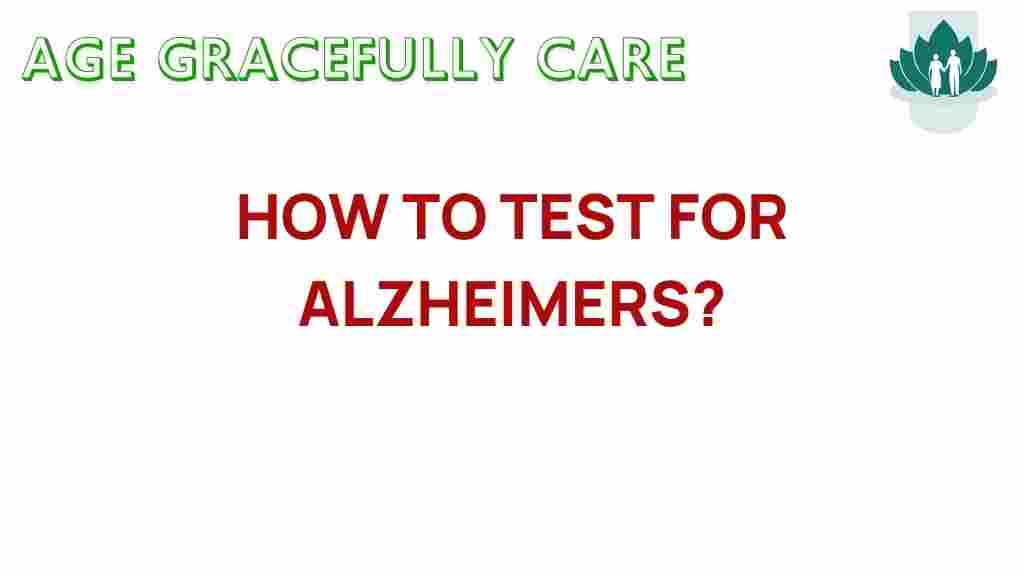Unraveling the Mystery: How to Test for Alzheimer’s Disease
Alzheimer’s disease is a progressive neurological disorder that affects millions of people worldwide. As one of the most common forms of dementia, early detection and diagnosis are crucial for managing symptoms and improving the quality of life for individuals affected by this condition. In this article, we will explore the various methods of testing for Alzheimer’s, including memory tests, cognitive assessments, and neurological evaluations, emphasizing the importance of early detection and understanding risk factors associated with the disease.
Understanding Alzheimer’s Disease
Alzheimer’s is characterized by the gradual decline of cognitive functions, primarily memory. It is essential to recognize the signs of Alzheimer’s early, as this can significantly impact treatment options and care plans. The journey to diagnosis typically involves a combination of medical history evaluations, cognitive assessments, and sometimes brain imaging.
Why Early Detection Matters
Detecting Alzheimer’s disease in its early stages can lead to:
- Better management of symptoms
- Access to clinical trials and research opportunities
- Improved planning for future care
- Enhanced support for caregivers and family members
Steps to Test for Alzheimer’s Disease
Testing for Alzheimer’s involves several steps that healthcare professionals typically follow to ensure an accurate diagnosis. Here’s a detailed look at the process:
1. Medical History Review
The first step in the diagnosis process is to conduct a thorough medical history review. This helps healthcare providers understand:
- Symptoms experienced by the patient
- Family history of Alzheimer’s or other dementias
- Current medications and health conditions
2. Cognitive Assessment
Cognitive assessments are crucial in determining the extent of memory and cognitive decline. These assessments may include:
- Standardized memory tests
- Problem-solving tasks
- Language skills evaluation
- Attention and concentration tests
Some common cognitive tests used include the Mini-Mental State Examination (MMSE) and the Montreal Cognitive Assessment (MoCA). These tests help quantify cognitive deficits.
3. Neurological Evaluation
A neurological evaluation involves a physical examination to assess:
- Coordination and balance
- Reflexes
- Sensory perception
This evaluation helps rule out other neurological conditions that may present similar symptoms to Alzheimer’s.
4. Brain Imaging
In some cases, healthcare providers may recommend brain imaging techniques, such as:
- Magnetic Resonance Imaging (MRI)
- Computed Tomography (CT) scans
- Positron Emission Tomography (PET) scans
These imaging techniques can reveal changes in the brain’s structure and function, which are indicative of Alzheimer’s disease.
5. Laboratory Tests
While no definitive blood test can diagnose Alzheimer’s, laboratory tests can help rule out other conditions that may cause similar symptoms. Common tests include:
- Blood tests to check for vitamin deficiencies and thyroid function
- Testing for biomarkers associated with Alzheimer’s
6. Family Input
Family members and caregivers play a vital role in the diagnostic process. Their observations regarding the individual’s behavior and daily functioning can provide valuable insights for the healthcare provider.
Risk Factors for Alzheimer’s Disease
Understanding the risk factors associated with Alzheimer’s is essential in identifying individuals who may be at higher risk. Some common risk factors include:
- Age: The likelihood of developing Alzheimer’s increases with age.
- Genetics: A family history of Alzheimer’s can raise the risk.
- Cardiovascular health: Conditions such as high blood pressure, diabetes, and high cholesterol can contribute to risk.
- Head injuries: A history of traumatic brain injury may increase risk.
- Lifestyle factors: Lack of physical activity, poor diet, and social isolation can impact cognitive health.
Common Symptoms of Alzheimer’s Disease
Recognizing the symptoms of Alzheimer’s is crucial for early detection. Common symptoms include:
- Memory loss, especially forgetting recent events
- Difficulty in planning or solving problems
- Confusion with time or place
- Challenges in understanding visual images and spatial relationships
- Changes in mood and personality
Troubleshooting Tips for Alzheimer’s Testing
If you or a loved one is undergoing testing for Alzheimer’s disease, consider the following tips:
- Stay organized: Keep a record of symptoms and changes in behavior to share with the healthcare provider.
- Prepare for appointments: Write down questions or concerns to address during the evaluation.
- Involve family: Encourage family members to participate in discussions with healthcare providers.
Being proactive can help ensure a thorough evaluation and accurate diagnosis.
Conclusion
Testing for Alzheimer’s disease is a multifaceted process that requires a comprehensive approach. Through memory tests, cognitive assessments, neurological evaluations, and family input, healthcare providers can accurately diagnose Alzheimer’s and create an effective management plan. Early detection is key to improving the quality of life for individuals with Alzheimer’s, allowing for timely interventions and support.
If you suspect that you or a loved one may be experiencing symptoms of Alzheimer’s, it is crucial to seek guidance from a healthcare professional. Remember, you are not alone in this journey—support and resources are available.
For more information on Alzheimer’s disease and its management, you can visit the Alzheimer’s Association for comprehensive resources and support.
Additionally, if you are looking for more information on cognitive health and assessments, check out our article on cognitive assessment techniques.
This article is in the category Health and created by AgeGracefullyCare Team
